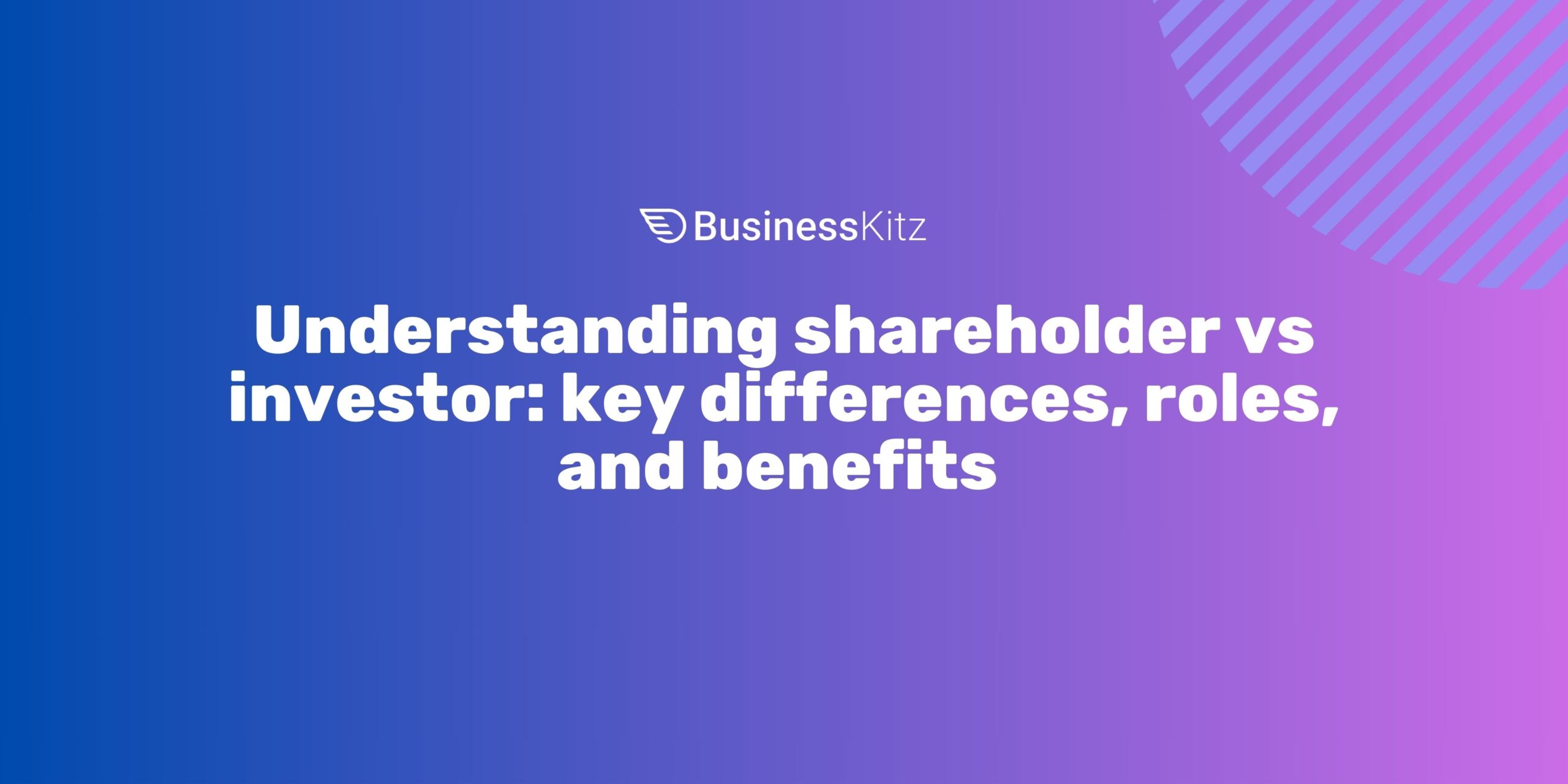
We've helped businesses save $55m with our all-in-one platform. Get instant access to this template and 115+ others, plus AI-powered document creation, starting completely free.
Understanding the difference between a shareholder and an investor is crucial for anyone looking to invest in a business. While both play significant roles in a company’s growth, their involvement varies. The key difference lies in ownership—shareholders own part of a company through shares, giving them voting rights and a stake in its success. On the other hand, investors provide capital without necessarily owning shares. In this article, we will explore the differences between shareholder vs investor and how each impacts a company's future.
A shareholder is someone who owns shares in a company. These shares represent ownership stakes in the company and give the investor certain rights and responsibilities. Shareholder investors are integral to the financial foundation of a business, as their capital investment helps fund operations, growth, and other strategic initiatives.
A shareholder and an investor both contribute to a company’s growth but differ in roles. Shareholders own company shares, granting them voting rights and dividends. Investors may fund businesses without owning shares, often focused on financial returns or growth potential without governance rights. Both support businesses, but their involvement and rights vary.
[ez-toc]
Shareholder investors provide capital by purchasing shares, making them co-owners of the company. This ownership allows them to benefit financially from the company's success through dividends or share price appreciation. As shareholders, they have a say in the company’s governance, typically through voting rights at annual general meetings (AGMs) or special meetings. Their influence extends to decisions such as electing directors, approving mergers, or voting on major financial actions.
While the terms “investor” and “shareholder” are often used interchangeably, they have distinct meanings.
Although all shareholders are investors, not all investors are shareholders. Investors might not necessarily hold shares but could invest in a business through other means, such as debt funding or private equity.
The main difference between the two lies in ownership. Shareholders directly own part of a company, whereas investors may or may not have ownership but expect returns on their investments.
Investors and shareholders are both critical to the success of a company, but they have different roles and levels of involvement. Here are the key differences:
An investor provides capital to a business, often in exchange for financial returns. The primary goal of an investor is to grow their money through returns, such as interest, equity appreciation, or dividends. Investors may be involved in various types of investments, such as purchasing bonds, stocks, or providing venture capital to startups.
Investors typically do not have direct control over day-to-day operations or decision-making but focus on maximizing returns on their investment.
A shareholder is a type of investor who specifically owns shares in a company. By owning shares, shareholders have a stake in the company’s ownership and play a more active role in the business’s governance. Shareholders receive dividends when the company performs well and its board decides to distribute profits.
Shareholders also have voting rights, which gives them influence over major decisions, such as electing directors or approving mergers.
InvestorShareholderProvides capitalOwns sharesNo direct controlHas voting rightsFocuses on returnsReceives dividends
In summary, while both investors and shareholders contribute to a company's financial well-being, shareholders have ownership and influence over the company, while investors are mainly focused on financial returns.
Becoming a shareholder investor involves a few clear steps. To start, you need to research companies, purchase shares, and understand the factors that influence share prices. Here's a simple guide to help you navigate the process.
Here is an overview of the most common investment types that may interest you as a shareholder:
Investment TypeControl LevelRisk FactorReturn PotentialStocksLowHighVariableBondsLowLowFixedPrivate EquityHighHighHigh
By understanding these basic steps and investment types, you can make informed decisions and start your journey as a shareholder investor.
Shareholders have specific financial rights and responsibilities linked to their ownership of shares. These rights impact their involvement in a company's financial decisions, profits, and governance.
In summary, shareholders are financially entitled to profits through dividends and share price appreciation. They also have significant influence through voting rights, which allow them to participate in crucial decisions at AGMs and other meetings. However, they also carry the responsibility to manage their investments wisely and ensure the company remains compliant with legal standards.
Shareholders have the right to vote on critical decisions that shape the future of a company. These decisions can include changes to the company’s structure, leadership, or business operations. Voting rights allow shareholders to influence important business moves, such as mergers, acquisitions, and board elections.
In conclusion, voting rights are one of the most powerful tools for shareholders to influence a company’s decisions. By actively participating in the voting process, shareholders can help guide the company toward long-term success and protect their financial interests.
Shareholders have legal responsibilities and play a key role in the governance of the companies in which they invest. Their actions help ensure that companies operate within the law and in the best interests of all shareholders.
In conclusion, shareholders not only have rights but also legal obligations to ensure the company operates fairly and effectively. Their involvement in governance and compliance helps safeguard the company’s future and protects their investment.
As a shareholder, managing your investment effectively is key to ensuring long-term growth and stability. Staying informed and tracking your company’s performance will help you make better decisions and protect your financial interests.
To manage your investment successfully, you need to stay informed about both the company and the market.
By staying engaged with your investments and the broader financial landscape, you can ensure that you make informed decisions and effectively manage your shareholder investments.
Understanding your role as a shareholder investor is essential for making informed decisions and achieving long-term success. Shareholders play a crucial role in both the ownership and governance of a company. Below is a recap of the key differences, rights, and responsibilities of shareholders compared to investors.
Being a shareholder means you are involved in more than just financial gains. Your voting rights influence company governance and decision-making. This involvement ensures that shareholders can steer the direction of the company, protecting their investments and shaping the company’s future.
As a shareholder, your long-term impact extends beyond the financial side of the business. Understanding governance processes and staying informed about company decisions allows you to effectively contribute to the company’s strategy and success.

As we’ve just covered, shareholders are equity owners in the company that they hold their shares in. Subsequently, shareholders can benefit from the company’s future growth by selling their shares. As the company grows, so does their share price. Shareholders can choose to sell their shares to make profit or wait until the company decides to pay dividends.
Depending on the class of securities, the company constitution and the shareholders agreement, shareholders may partake in the financial workings and certain management actions of the company. Generally, shareholders have the right to:
Similarly to a shareholder, an investor is anyone who invests money into a company with the purpose of taking ownership interest in that company. An investor places their money into the business to assist the business in growing and developing, in order to generate a large financial return after the term of their investment is up.
However, an investor can invest money into a company that does not distribute shares. For example, many investors choose to invest money into a start-up company, in the hopes that the company will excel in later years.
There can be a number of benefits for both shareholders and investors. The major thing to consider when deciding to become an investor is to look for the
To register as a shareholder, you need to purchase shares through a broker or secure online platform. Investors, whether individuals or entities, also need to complete an agreement and register their details with the investor centre. If you need assistance with the registration process, please contact us for help.
Access your shareholder info through the investor centre’s secure login. This platform allows you to track shares, view agreements, and manage details. If you encounter any login issues, please contact us for assistance.
Shareholders at an AGM (Annual General Meeting) have a duty to vote on important company matters, such as board elections and major company decisions. Engagement at AGMs helps enhance governance and ensures shareholders take control over key company directions.
Investors in a public company should track financial health, engage with administration, and monitor company updates. Duties might include reviewing the privacy policy, understanding financial reports, and keeping up with monthly updates. Investors can also connect with the issuer for additional info or concerns.
Yes, employees can become shareholders or investors by purchasing shares in the company, often through employee stock plans. Employee shareholders have the same rights and responsibilities as other shareholders, including voting and receiving payments if dividends are distributed.
For guidance on your rights and obligations, please contact us to connect with a qualified lawyer. Legal assistance helps clarify specific rights, administer agreements, and ensure compliance with particular circumstances.
A shareholder owns shares in the company, giving them voting rights and potential dividends. An investor, however, may invest in a business without holding shares, focusing on returns without engaging in company administration or governance decisions. Both roles are crucial but differ in influence and engagement.
potential profitability of the company. Many investors put money into companies in the early stages of the business, in order to provide the business with the funds to build, grow and develop their brand. The main purpose of investing in a company is to receive a stake or return from the business.
Before making any investments, it’s important to seek professional advice. Legal and financial advisors can guide you through the complexities of becoming a shareholder investor. They can help you understand your rights, responsibilities, and the potential risks involved. Consulting with experts ensures you make informed decisions that align with your financial goals. To make your business more compliant visit Business Kitz.
Copyright © 2025 Business Kitz 14312161